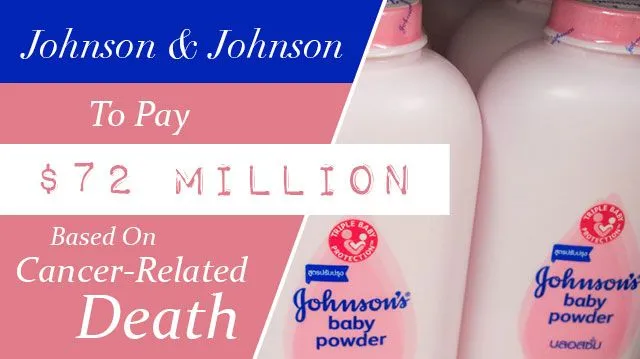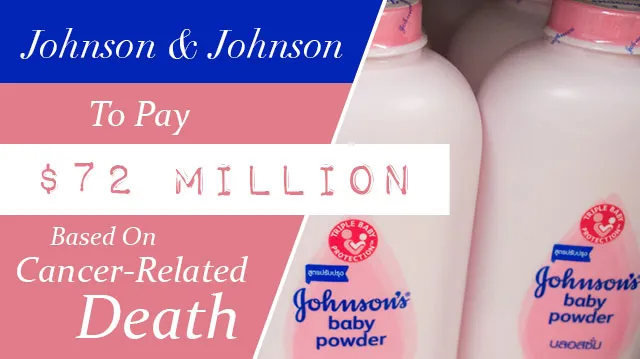
- Share on Facebook507
- Share on Pinterest
- Share on Twitter
Many products on the market today contain harmful additives that impact hormone levels and increase the risk of disease — this is nothing new. Although you would expect companies to be ethically sound, especially when distributing products intended for babies, unfortunately, this isn’t the case.
Awareness is lacking, and possible health risks associated with many products are not reported to the public. However, consumers are becoming increasingly savvy about the potentially toxic chemicals used in personal hygiene products. The family of one Alabama woman has fought back.
Jacqueline Fox sadly died recently from ovarian cancer as a result of using Johnson & Johnson talc-based baby powder for decades. Following a lawsuit over the link between Johnson & Johnson baby powder and cancer risk, a court has ordered Johnson & Johnson to pay the Fox family $72 million in damages.
History of toxic ingredients and lawsuits
This isn’t the first time that Johnson & Johnson has made headlines based on the dangerous ingredients and additives in its products. Back in 2009, a group known as the Campaign for Safe Cosmetics pressured Johnson & Johnson to remove ingredients that were potentially dangerous for both babies and adults.
For three years, petitions and boycott threats led the company to finally eliminate formaldehyde and 1,4-Dioxane from its products in 2012 — both of which are possible human carcinogens. It was clear that these additives were harmful, yet profits reigned supreme.
Related: No More Tears Formaldehyde Free
Over the past few years, Johnson & Johnson has faced a number of class-action lawsuits from individuals who have developed ovarian cancer as a result of using its talc products. This most recent case, however, was the first among more than 1,000 lawsuits to end in a monetary settlement. Although it is unlikely that the $72 million payout will hold up after the company appeals, hopefully more women will now be able to protect themselves.
Jacqueline Fox vs. Johnson & Johnson
The Fox family was awarded $10 million in compensatory damages and $62 in punitive damages. Although it is refreshing that Johnson & Johnson is being held accountable for its actions, no amount of money can bring back a life that was taken too soon.
The case against the company centered around Johnson & Johnson’s negligence in informing consumers of the potentially harmful ingredients in its talc-based products. Johnson & Johnson failed to warn women for decades regarding these dangerous ingredients, more than likely to support growing sales.
Jacqueline Fox used Johnson & Johnson’s Baby Powder and its Shower to Shower product for over 35 years. Diagnosed three years ago with ovarian cancer, she sadly died this past October at the age of 62. Based on negligence, fraud and conspiracy, the jury found Johnson & Johnson liable following a three-week trial and four hours of deliberation.
The Fox family’s lawyer stated that Johnson & Johnson knew since the 1980s that there was a significant risk, yet the company continually lied to the public. A pathologist did find that Fox’s ovaries were, in fact, inflamed from talc exposure, and in turn, a fatal form of cancer developed.
Johnson & Johnson continues to state that the verdict goes against decades of scientific research regarding the link between talc and cancer. Although the official evidence is mixed, with most reports stating that it’s a “possible” human carcinogenic, there’s no denying that this ingredient places women at risk.
Report: What’s Wrong with Baby Powder?
 It’s been suggested that when talcum powder travels through the vagina to the ovaries, the development of cancer is most certainly a possibility. A 2010 study, published in Cancer Epidemiology, Biomarkers & Prevention found that when analyzing over 66,000 women, talcum powder was associated with endometrial cancer. In fact, those who used it on a regular basis (once a week), experienced an increased risk of 24 percent.
It’s been suggested that when talcum powder travels through the vagina to the ovaries, the development of cancer is most certainly a possibility. A 2010 study, published in Cancer Epidemiology, Biomarkers & Prevention found that when analyzing over 66,000 women, talcum powder was associated with endometrial cancer. In fact, those who used it on a regular basis (once a week), experienced an increased risk of 24 percent.
A more recent study, published in the International Journal of Gynecological Cancer found that talc use increased ovarian cancer risk by 30 to 60 percent. In fact, it was concluded that the elimination of talc could potentially protect more than one-quarter of the women who develop ovarian cancer.
These two studies are simply a tiny fraction of the available scientific evidence, which Johnson & Johnson has access to. Why is it that women are being left in the dark? Like Ms. Fox, millions of women have used this powder on a daily basis.
Now facing more than 1,200 pending lawsuits, Johnson & Johnson will more than likely continue to make headlines in the near future, as women across the country come forward regarding their use of talc-based baby powder and the onset of ovarian cancer.
—Krista Hillis
Krista Hillis is passionate about nutrition, mental health, and sustainable practices. She has her Bachelors in Psychology and Neuroscience and is still active in her research. Studying both the body and mind, she focuses on natural health and balance. Krista enjoys writing based on her ability to inspire others and increase overall awareness.
Sources:
Karageorgi, S., Gates, M., and Hankinson, S. (2010). Perineal Use of Talcum Powder and Endometrial Cancer Risk. Cancer Epidemiology, Biomarkers & Prevention. 19. 1269. doi: 10.1158/1055-9965.EPI-09-1221
Ness, R. (2015). Does Talc Exposure Cause Ovarian Cancer? International Journal of Gynecological Cance. 25(51)
Stempel, J (2016). Johnson & Johnson To Pay $72 Million For Cancer Death Linked To Talcum Powder. Huffington Post. Retrieved from http://www.huffingtonpost.com/entry/johnson-johnson-talcom-powder-lawsuit_us_56cd1083e4b0928f5a6dac44
Wang, Y. (2016). Johnson & Johnson ordered to pay $72M in lawsuit linking talcum powder, cancer. Washington Post. Retrieved from http://www.thestar.com/business/2016/02/24/johnson-johnson-ordered-to-pay-72m-in-lawsuit-linking-talcum-powder-cancer.html
- Share on Facebook507
- Share on Pinterest
- Share on Twitter

